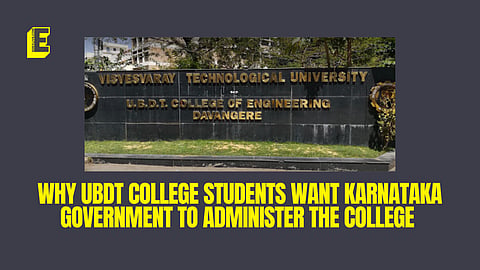

For a few weeks, students of the University BDT College of Engineering in Davangere, Karnataka, have been appealing to the state government to take full control over the college's administration and funding.
This request comes in light of the new Management Quota introduced in the college by the state government from the current (2024-2025) academic year.
The announcement led to significant backlash from the college's students and academic community, and student groups like the All India Democratic Students’ Organisation (AIDSO) staged a bandh in Davangere on October 16, in opposition to the move.
Under the Management Quota system, 50 per cent of the seats would be “sold” for a fee of Rs 97,000, AIDSO alleges. To recall, the system was introduced by the Visvesvaraya Technological University, which runs the college.
The organisation also submitted a resolution to Chief Minister Siddaramaiah against the payment seats policy.
This begs the question, what potential problems does the quota pose, and what would it mean for engineering aspirants who want to study at UBDT College?
EdexLive speaks to a few students from the college to understand the potential pitfalls posed by the payment quota system better.
Financial strain on students
Students say that the most fundamental problem with the payment quota is the financial burden it poses on students, particularly those from weak socioeconomic communities or families, who would not be able to afford the exorbitant fees.
“This is a fundamentally anti-student and anti-poor policy,” says Suman TS, a second-year engineering student from the college. “By introducing management quota seats, you are cutting down on the number of opportunities for more meritocratic students, who might not be able to afford the management quota seats,” he explains.
Many students even claim that the non-payment quota fees are also quite strenuous to begin with.
“Almost all of the students studying at BDT College come from low-income households, who struggle to even pay the regular fees. Even I have taken an education loan to pay my fees,” says Adarsh Yattada, a third-year engineering student at the college.
He alleges that the fees have been hiked by Rs 2,000 for the new batch every academic year. “When I joined the college in 2022, the fee was Rs 38,200. The current batch of students is paying Rs 42,000,” he says.
In addition, he says that VTU also collects an additional Rs 1,500 from students for “Skill Development courses”.
More troublingly, students are being forced into the management quota seats, and are having to pay Rs 97,000.
The students wonder why a public education institution collects such exorbitant fees from its students to keep itself running.
“Despite approaching the Minister of Higher Education Dr MC Sudhakar, our requests fell on deaf ears. We even submitted a petition, with 3400 signatures, but that was rejected, as the government did not have the funds to run the college, and resorted to relying on fees,” Adarsh alleges.
Might set a bad precedent
Students say that this policy of financing the college’s functioning through students’ fees is evocative of the “self-financing” and “autonomous” model of education, prescribed under the National Education Policy of 2020 (NEP 2020),
To recall, after the Indian National Congress came to power in the Karnataka Assembly Elections last year, it announced that it would not follow NEP 2020, and would introduce an alternate state education policy for Karnataka.
However, developments like the payment quota make students worried that the new policy would just be NEP 2020 in a new dressing, they say.
“We do not know how much the State Education Policy would be inspired by the NEP,” Suman says.
He adds, “There is also no guarantee that the management quota allocation would stop at 50 per cent. It could increase to 75 per cent, and eventually, to 100 per cent too.”
Attesting to this, Adarsh alleges that the Higher Education Ministry is considering implementing a 50 per cent management quota in all VTU-affiliated engineering colleges.
Direct gov’t administration need of the hour
Students say that the root of this problem lies in the fact that UBDT College does not lie under the direct control and funding of the Karnataka State Government.
“When it was first established in 1951, the college was called the Government BDT College, as it fell directly under the government’s control. However, the college was transferred to the Kuvempu University in Shivamogga in the 1990s, and then to the Davangere University in 2009 to function as their constituent colleges. Since 2011, it has been a constituent college of VTU,” explains Suman.
He alleges that VTU is unable to afford the maintenance of the college by itself, and has thus introduced the management quota.
“It is clear that universities are unable to sustain and develop the BDT College. As a result, we call for the Karnataka State Government to take full control over the administration, functioning and funding of the college,” he says.
“Many engineering colleges in the state still have seats vacant. They will all be filled up if the government takes direct control of the engineering colleges in Karnataka and funds them adequately, removing the need for fee hikes and management quotas,” Adarsh adds.
On Saturday, October 19, AIDSO met CM Siddaramaiah with this demand. The CM told the organisation that he would “look into it”, they informed EdexLive.
